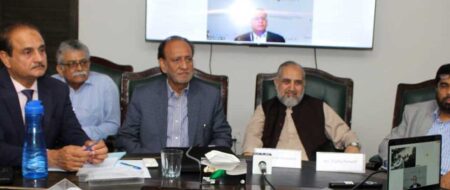Ten Years of US Campaign in Afghanistan: Gains, Losses and Prospects
On October 12, 2011 a seminar titled “Ten Years of US Campaign in Afghanistan: Gains, Losses and Prospects” was organized. Rustam Shah Mohmand, former Pakistan’s ambassador to Afghanistan, Lt. Gen (r) Asad Durrani, former DG ISI and Prof. Khurshid Ahmad Chairman IPS were the key note speakers while Akram Zaki, former Secretary General Ministry of Foreign Affairs GoP and Member IPS NAC chaired the session and DG IPS Khalid Rahman made the opening remarks.
On October 12, 2011 a seminar titled “Ten Years of US Campaign in Afghanistan: Gains, Losses and Prospects” was organized. Rustam Shah Mohmand, former Pakistan’s ambassador to Afghanistan, Lt. Gen (r) Asad Durrani, former DG ISI and Prof. Khurshid Ahmad Chairman IPS were the key note speakers while Akram Zaki, former Secretary General Ministry of Foreign Affairs GoP and Member IPS NAC chaired the session and DG IPS Khalid Rahman made the opening remarks. While discussing the context in which the event was organized, DG IPS said that the war which had started in retaliation to a less than 3,000 killings has, according to the most pessimistic estimates, had taken 225,000 lives so far while about 365,000 were injured. He said that Pakistan lost around 35,000 of its citizens and the irony is that hardly anyone seemed to have noticed it. He said that US announced withdrawal from Afghanistan by 2014 but at the same time was planning to ensure a permanent presence by building bases for its troops in Afghanistan.

Quoting a recent report by Brown University’s Watson Institute for International Studies’, he informed that in 2001 the number of coalition military fatalities were 12 in number which has continuously increased with each passing year and toll reached up to 711 in 2010.
Rustam Shah Mohmand historicized the US campaign in Afghanistan by referring the instances of US interventions and invasions in other parts of the world which significantly include Japan, Korea and Vietnam. He remarked that access to Central Asian energy reservoirs, containment of China, intimidation and encirclement of China and watching Pakistan’s nukes were the US objectives in Afghanistan. He stressed the unavoidable need to launch a peace bid in conjunction with Afghanistan and co-opting Saudi Arabia to bring an end to this conflict. While Pakistan is unable to take any meaningful initiative with regard to reconciliation, it would augment apprehensions with regard to Pakistan’s bona fide attempt for reconciliation in Afghanistan. He stressed the great need to come up with a viable strategy to bring an end to this conflict.
{niftybox background=#EBF5FF}
Lt. Gen (r) Asad Durrani debunked the myth and common narrative that Pakistan fought the US war in 1980s, saying that it was Pakistan’s own decision which was later supported by the United States due to convergence of interests. He said that Pakistan never worked for loyal government in Kabul instead it always looked for a stable government having representation from all ethnic groups in Afghanistan. He said that Pakistan has had important cards to play vis a vis a Afghanistan but the question is as to how the people at the helm of affairs play them to bring stability in Afghanistan.
{/niftybox}
 |
 |
{niftybox background=#EBF5FF}
Prof. Khurshid questioned whether it was terrorism or response to terrorism which cost the world more. He said that it was the US war in Afghanistan that resulted in the globalisation of terrorism and instability. Emphasizing that while one should not be unnecessarily obsessed with conspiracy theories, he argued that 9/11 could note be term as the paradigm shift in the US policy as far the key principles of the foreign policy of the United States were concerned. Rather, it was the continuation of its early policy of the Cold War and post-Cold War, he added.
While referring the recent book “Cutting the Fuse: The Explosion of Global Terrorism and How to Stop It” he argued that one of the major causes of the so called terrorism was the foreign occupation, “over 98.5 of terrorism was due to the foreign military occupation and of them 92% was due to the military presence of the United States” he quoted Prof. Robert A. Pape, author of the book and a noted American political scientist.
He suggested that there was a need to redefine our terms of engagement with the United States adding that though situation was bleak, there is still a silver lining and if people at the helm in Pakistan play their role with courage and prudence, things could move in positive direction.
{/niftybox}
{niftybox background=#EBF5FF}
Akram Zaki observed that the decade long US campaign in Afghanistan brought death, destruction, delusion, instability and uncertainty. He said that Obama was the product of the Main Street but now he was safeguarding the interests of the Wall Street and it was why Main Street was getting against him. He opined that the United States had failed to achieve its objectives in Afghanistan but she was not ready to accept the fiasco and intended to live longer in Afghanistan.
He pointed out that since the surge of 30, 000 US troops in Afghanistan could not bring the desired results, the United States had to look for a scapegoat for failure in Afghanistan. He opined that unless there was a meaningful dialogue within Afghanistan, the Bonn or London Conferences would not bring any good for the future of Afghanistan.
Amb. Zaki argued further that invasion in Afghanistan was predetermined by the United States and not merely caused by 9/11incident. “The NATO was informed in July 2001 that the United States will attack Afghanistan and on 9 September 2001 [just two days before 9/11] a proposal to launch an attack on Afghanistan was moved in the Oval Office” he claimed.
{/niftybox}












